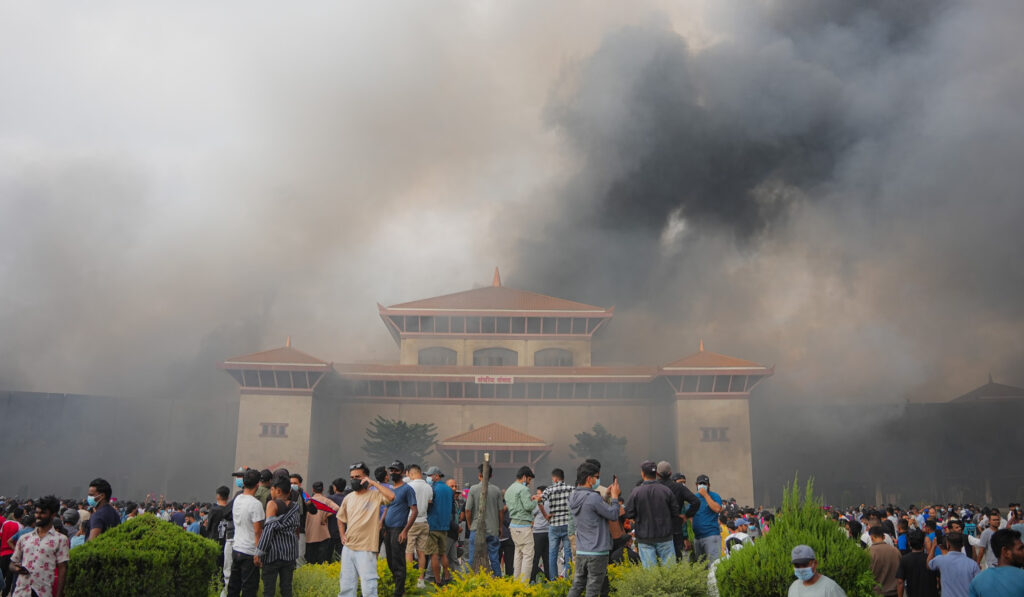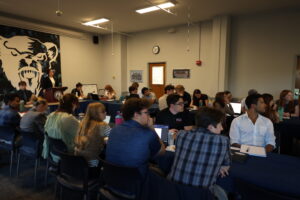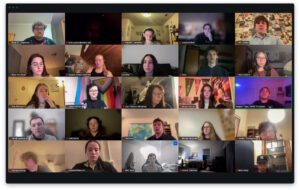When the government of Nepal banned over two dozen social media platforms on Sept. 4, Nepali international students at University of Maine (and across the nation) suddenly found themselves cut off from family during one of the most turbulent moments in their country’s recent history. Now, after youth-led protests that have left over 70 dead and pushed top officials like former Prime Minister K.P. Sharma Oli to resign, members of the UMaine’s Nepalese Student Association (NSA) say these ‘Gen Z protests’ are about far more than a social media ban. Rather, they connect directly to deep-seated issues in Nepal, including political corruption and nepotism. The Maine Campus spoke with NSA members to better understand factors that led to widespread anti-corruption protests, hopes and reservations surrounding the new interim government and ways UMaine can support the Nepali community on campus.
According to a Sept. 4 report from AP News, the initial crackdown on social media platforms was prompted by a demand that companies like Facebook and YouTube comply with regulations that require them to register with the government. The companies that failed to comply were blocked. In the days following, the move was widely criticized and then protested against as a blatant censorship of free speech and fundamental citizen rights.
President of the Graduate Student Government and NSA member Sudati Shrestha said the ban “happened abruptly” and triggered a situation where “so many of us couldn’t figure out alternative ways to connect with our friends and family.”
Graduate student and NSA member Yuvaaraj Karki elaborated on the shock of discovering 26 widely used platforms had been banned and the impact that move has on Nepali students studying abroad.
“Most of the Nepali youths are abroad either for study or for work. We use social media to talk with our family back home. For the initial two days of the ban, we had no contact at all,” said Karki.
As tensions rose leading up to the first major ‘Gen Z protest’ on Sept. 8 in Kathmandu, UMaine alumni and NSA member Suman Acharya described the emotional toll being disconnected during a period of increasingly violent political pushback.
“When the social media ban was enforced, I suddenly lost contact with them [my family] for more than three days. This created a deep sense of anxiety, especially because they are elderly and live alone in Nepal. At the same time, the country was going through a period of unrest, which only heightened my worry,” said Acharya, although he was able to find reassurance in following global newsfeeds outside the nation until the ban was lifted on Sept. 9 due to pushback.
As news of the protests circulated the globe, headlines emphasizing the role of ‘Gen Z protestors’ dominated news cycles, whereas articles focused on the core grievances of corruption are limited — as doctoral student and NSA member Astha Rai describes.
“While the ban appeared to be about social media, people’s anger was rooted in deeper frustrations with corruption and governance. The ban became the trigger that made those frustrations visible, but the protests were really about much more than just losing access to platforms. People feel that the ban was an attempt to silence voices and avoid accountability,” said Rai.
When asked for specific examples of corruption, Rai explained,
“For example, there are widespread concerns about misuse of public funds, where money meant for development or services does not reach the people. Bribery is common in many government processes, making it harder for ordinary citizens to get fair treatment.”
Rai also touched on the issue of nepotism in government when awarding positions of power — which is an issue that echoes a wider ‘nepo-baby’ backlash seen elsewhere in South Asian countries — from Sri Lanka’s 2022 uprising against the Rajapaksa family to ongoing protests in the Philippines, Indonesia and Malaysia over increasing corruption.
“These patterns [of nepotism] create a sense that the government serves only a few, while the majority face rising living costs, poor infrastructure and limited opportunities,” said Rai.
Others mentioned that frustration extends to the traditional media landscape in Nepal, exemplified by events on Sept. 9, when protestors set fire to the offices of the privately owned Kantipur Media Group — which owns the Kathmandu Post, one of the major news outlets in the nation.
“Outlets like The Kathmandu Post can play an important role in amplifying protesters’ voices, but many youths believe coverage has focused too narrowly. Portraying the movement as just a ‘Gen Z reaction’ to the social media ban instead of addressing the deeper grievances about corruption, inequality and misuse of power. This mismatch created frustration, and in some cases, anger spilled over into targeting media offices,” said Rai.

Regardless of the numerous reasons for the protests, the result is the same — Nepal’s political system has been forced into a period of transition. The resignation of former Prime Minister K.P. Sharma Oli followed by the Sept. 14 election of former Chief Justice Sushila Karki to lead the nation’s new interim government until March elections marks a turning point that will test whether public demands for accountability are finally met.
Some NSA members, including Shrestha, cited excitement over what Karki’s election represents symbolically as the first woman elected to the position of prime minister.
“Sushila Karki becoming the first woman Prime Minister of Nepal is a historic moment for the country. Her appointment marks a powerful shift toward greater inclusion and representation,” said Shrestha.
Looking toward the future, NSA members shared that the formation of the interim government can only be the first step, as graduate student and vice president of the NSA Sarala Dhakal explained.
“This interim government will work on restoring rights, calming the streets and preparing for fair elections. But just changing the leader is not enough,” said Dhakal. “Youth should also have more opportunities to participate in decision-making…[and] there is still some fear in youth that old, corrupted leaders might play some games in future. Whether it requires changes to the constitution or forming new parties, all these should be decided openly with public input.”
Other members pointed to a need for stronger structural changes, including graduate student and NSA member Sandesh Thapa.
“The current parliament should dissolve at all levels and the interim government should work on having the prime minister elected by the people,” said Thapa.
Others like Acharya suggested that lasting change must come from within Nepal’s existing political system rather than through continual reinvention.
“I don’t think Nepal needs an entirely new constitution, given the immense time and effort that went into drafting the current one. However, meaningful amendments are urgently needed, especially since constitutional reform is one of the strongest demands of the protesters. As for political parties, I don’t believe creating yet another new party is the answer—we already have hundreds,” said Acharya. ”If young people, especially those who have been at the forefront of these protests, are given space to lead alongside experienced but accountable figures, that would mark a real turning point for Nepal’s governance and democratic future.”
NSA members also reflected on how the UMaine community can play a role in supporting students from Nepal during this time.
“I think as international students and as a community, the best way we can help is by communicating with each other and sharing our problems openly. One good conversation can heal so many things, and it helps us fight against isolation,” said Dhakal.
Acharya added that accurate information is one of the most valuable forms of support.
“At this stage, the most important role we can play is to ensure that only authentic and accurate information is shared. For now, staying engaged, remaining united and raising positive awareness within our communities can be a meaningful contribution,” said Acharya.











